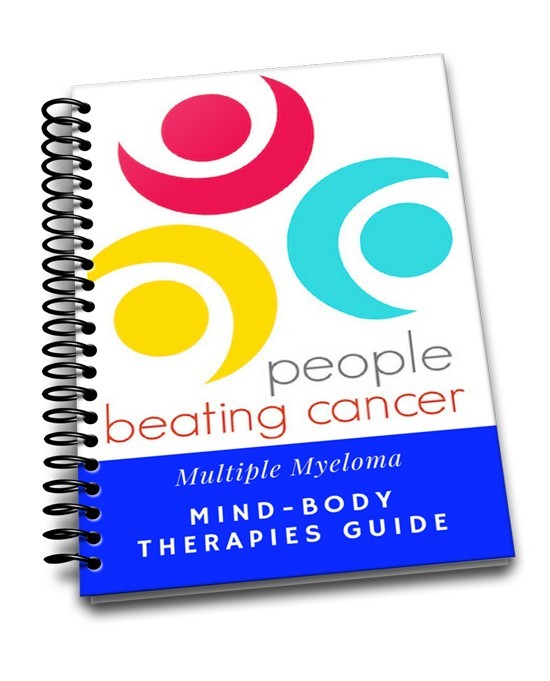What does it mean to “put a good spin on your life?” What exactly is “the new normal?” Do multiple myeloma patients get annoyed when someone tells them to “look on the bright side of life?” What is mind-body therapy?
I’ll be direct. A diagnosis of multiple myeloma (MM) sucks. Our cancer is complicated, debilitating, sometimes painful-both emotionally and physically. Multiple myeloma survival is difficult. Believe it or not, positive thinking helps.
Let me explain…
I encourage you to yell, cry, punch a punching bag. Do whatever you want. After you get all the negativity out of your system, read up on and practice mind-body therapies.
Mind-body therapy and multiple myeloma
To Learn More About Cancer Survivor Mental Health- click now

In addition to info about positive thinking, a common theme running throughout PeopleBeatingCancer is that multiple myeloma is incurable in the eyes of conventional oncology. Multiple myeloma survival requires more than chemotherapy induction, stem cell transplantation and maintenance chemotherapy.
The issue is much more complex than just “look on the bright side of life.” There are concrete, methodical approaches to changing how we think—and also wrong ways to do it.
Two studies, published together in March in the Journal of Personality and Social Psychology, showed that people who frame events in their lives—even negative ones—in positive ways have better mental health, and those who frame events in negative ways have poorer mental well-being…
- Agency—Did the subjects feel able to influence and respond to events in life, or did they feel battered around by the whims of external forces?
- Communion—Are the people connected to others or disconnected?
- Redemption—Did the subjects take a negative experience and find some positive outcome?
- Contamination—Did they tell narratives of good things turning bad?
And they found similar results: People whose personal narratives—the stories they told themselves—contained more agency, communion and redemption, and less contamination, saw their mental health improve, even after getting a serious illness…
When reframing negative events, acceptance is crucial, says Hal Shorey…
“If negative events and their impacts are not first acknowledged, the experience of invalidation can actually lead people to hold on to the negative narrative,” he says. But there eventually comes a point when it’s healthier to just move on, he says…”
It is difficult to pin down exactly what these slang phrases actually mean to a MM patient or survivor. The thing is, these words, these philosophies point to an important therapy. A mind-body therapy that you will need for the rest of your life.
If you are a newly-diagnosed multiple myeloma patient it’s important to keep in mind that you will need to think through the ups and downs of your treatment and beyond. I call it riding the MM roller coaster. MM survival is difficult. Further, it’s important to understand that, as the article below points out, Personal narratives “keep us sane.”
For more information about mind-body therapies for multiple myeloma patients and survivors, scroll down the page, post a question or comment and I will reply ASAP.
Thank you,
David Emerson
- MM Survivor
- MM Cancer Coach
- Director PeopleBeatingCancer
Recommended Reading:
“In the fall of 2018, Teri Cettina began feeling a mysterious pain around her ribs. “I thought I had done too many ab exercises at the gym,” says the 55-year-old health writer from Portland, Oregon.
When Cettina visited her doctor, her blood and urine tests came back normal. But over the next several weeks, the pain worsened. Convinced her muscles were out of whack, she saw a physical therapist who did a 10-minute exam and told Cettina, “This is not musculoskeletal; it’s not a rib thing. It’s deeper — you need to see your doctor today.”
Later that day, Cettina had a CT scan and received a diagnosis: pancreatic adenocarcinoma. Cettina’s tumor was particularly troubling because it was entangled in her veins and branches of the aortic artery, making surgical removal virtually impossible. Such grim news would send even the most hopeful optimist into a tailspin…”
“We all create narratives to process information and make sense of events, whether as explicitly as Mr. Baker or in subtler ways. The way we construct these stories has a large impact on our mental health, new research shows…”
“Positive thinking helps with stress management and can even improve your health. Practice overcoming negative self-talk with examples provided...
Indeed, some studies show that personality traits such as optimism and pessimism can affect many areas of your health and well-being. The positive thinking that usually comes with optimism is a key part of effective stress management. And effective stress management is associated with many health benefits. If you tend to be pessimistic, don’t despair — you can learn positive thinking skills…
Practicing positive thinking every day
If you tend to have a negative outlook, don’t expect to become an optimist overnight. But with practice, eventually your self-talk will contain less self-criticism and more self-acceptance. You may also become less critical of the world around you.
When your state of mind is generally optimistic, you’re better able to handle everyday stress in a more constructive way. That ability may contribute to the widely observed health benefits of positive thinking.”




